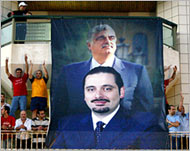Hizb Allah seeks cabinet seats
The Shia party Hizb Allah said on Monday that it is seeking cabinet posts for the first time in the new Lebanese government, in a move likely to complicate UN demands for its disarmament.

“It has become our right to participate directly and not just through our allies in the decision-making process,” said Muhamad Raad, head of Hizb Allah’s parliamentary bloc, which holds 14 of the legislature’s 128 seats.
Fellow Hizb Allah MP Mohammed Fneish said the movement, which was involved in deadly clashes with Israeli troops in a disputed border zone last week, was seeking two cabinet posts.
The announcement on Monday followed the collapse of prime minister designate Fuad Saniora’s efforts to bring in the party of former general Michel Aoun, a Christian, to a new coalition. Aljazeera reported that informed sources have attributed the impasse to the difficulties involving agreement on cabinet portfolios.
Opposing disarmament
Hizb Allah competed for last month’s elections in alliance with rival Shia faction Amal on a single-issue ticket opposing disarmament of its military wing in compliance with Resolution 1559 passed by the UN Security Council in September.
The Future Movement of the prime minister designate – led by Saad al-Hariri, a Sunni Muslim – formed electoral deals with Hizb Allah and spoke out during the campaign against disarming the resistance.
Saniora abandoned efforts to woo Aoun, whose Free Patriotic Movement was the only major faction to advocate compliance with Resolution 1559, albeit through negotiations with the fundamentalist group.
“It is impossible to respond to the demands of Michel Aoun concerning the ministries that his movement would like to have,” said Saniora, who is tasked with forming the first government since the pullout of Syrian troops from Lebanon in late April.
Justice portfolio
Aoun’s movement had insisted it be given the justice portfolio, but al-Hariri rejected the call, saying his party needed to control the ministry amid the continuing inquiry into the 14 February assassination of his father, the former prime minister Rafiq al-Hariri.
 |
|
Saad al-Hariri says he wants |
The rejection prompted Aoun to tell al-Hariri that his bloc of 21 MPs, which swept the third round of Lebanon’s elections for central areas, would not take part in the government.
Former finance minister Saniora was named on Thursday to head the government, and he pledged to try to reunite the country and embark on across-the-board reforms.
Pro-Damascus President Emile Lahoud agreed to designate Saniora, 62 and a close ally of the late Rafiq al-Hariri, after all but two MPs nominated him for the prime minister’s post.
Saniora has made clear that another priority for the government is to uncover the truth about the assassination of al-Hariri and subsequent killings of an anti-Syrian journalist and a veteran communist politician, George Hawi.
Allegations of complicity
Former general security chief Jamil Sayyed, who stood down from his post amid opposition allegations of complicity in al-Hariri’s killing, expressed doubt in comments published on Monday that the perpetrator of the huge bomb blast on the Beirut seafront would ever be found.
“According to international experts, in an explosion as powerful as this one no trace of the bomber is left if it is a suicide attack and DNA analysis is impossible,” Sayyed told the Saudi-owned London daily Al-Hayat.
A UN team began an inquiry into the bombing last month after a fact-finding mission found serious flaws in Lebanon’s investigation.
It has identified the likely vehicle used to carry the explosives and has questioned senior officials in post at the time.